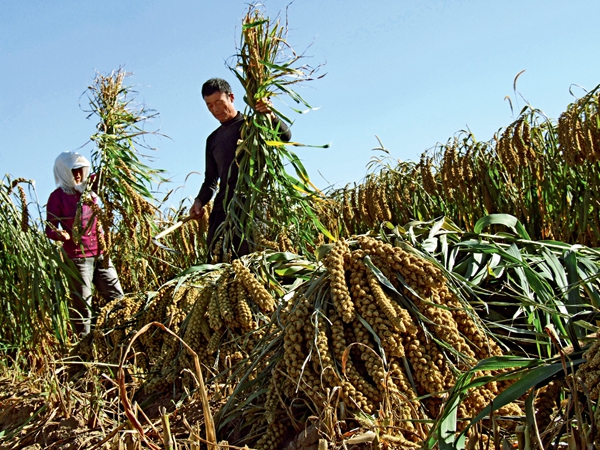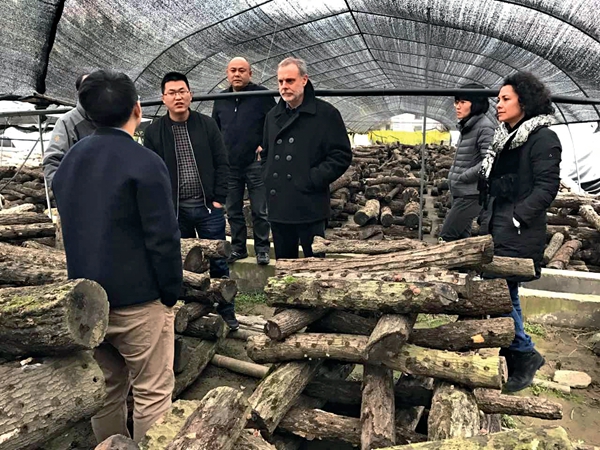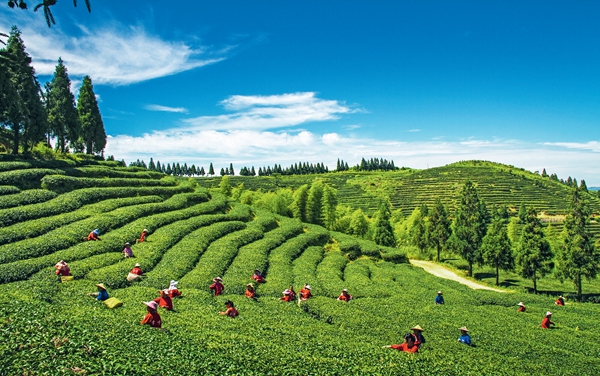Reducing Poverty Through Shared Experiences – An Exclusive Interview with FAO Representative in China Dr. Vincent Martin
By staff reporter LIU YI
IN the last 30 years, between 1978 and 2010, more than 600 million Chinese shook off poverty. China has made huge contributions to the alleviation of world poverty, and in 2015 China initiated a new campaign vowing to completely eradicate poverty in the country.
“China impressed the world with its achievement in poverty reduction in the last three decades. Its experience will be very helpful and inspiring for other countries,” commented Dr. Vincent Martin, the Food and Agriculture Organization (FAO) representative in China. The FAO is the largest international agency focusing on agricultural development, food security and poverty alleviation. It has maintained collaboration with the Chinese government in this regard for more than 35 years.

Dr. Martin holds a PhD in veterinary medicine and a PhD in agronomic sciences and biological engineering. About 10 years ago, he served as senior technical adviser of FAO in Beijing and created the China office of the Emergency Center for Trans-boundary Animal Diseases. In August 2016, he returned to China as the head of the FAO China office.
A keen observer, Dr. Martin told China Today the key elements he summarized from China’s success in the battle against poverty, and how important it is to promote the experience to other developing countries.
Four Key Factors for China’s Success
Regarding China’s achievement in poverty reduction, Dr. Martin listed four key factors that could be shared with other countries. First and most important, in his opinion, is strong leadership that is able to drive the campaign forward.
“Strong support from the highest level of government has been conducted to the lower levels of government – to provincial, prefectural, and county levels and eventually to the communities,” said Dr. Martin. Since taking office in August 2016, Dr. Martin has visited many poverty-stricken areas such as some small villages in Sichuan Province. “I can see that every level of government has attached great importance to poverty reduction.”

The second element is multi-dimensional efforts. Poverty does not exist isolated, Dr. Martin said, the reasons vary and interlink with each other; you cannot eradicate the problem from one angle, but need to address it in a comprehensive way. China has integrated efforts from different ministries and disciplines – such as agricutural education, healthcare, and social security – and different sectors including various industries such as agriculture.
Identifying targeting methods is the third factor. Having previously worked for a long time in Africa on a food security endeavor, Dr. Martin found that a firm commitment to poverty reduction couldn’t be realized in some countries because, first of all, the government didn’t know who were the poorest of the poor and where they were, let alone able to help them.
The strategies to deal with poverty will eventually be worked out and play an important role only if specific groups are found and identified. However, it takes time and energy to build the database. For example, the recent poverty elimination campaign China launched in 2015 features only on-target or precision measures. The families and villages that are still struck in poverty have been discerned and their information is carefully filled in, one by one, and updated regularly. The relieving formulas are made on the basis of the specific situation of each family. Dr. Martin believes that on-target measures are the key for poverty eradication, and said, “If you don’t know where these people are, the policy will lose focus.”
Last but not least, is innovation. “If you want to strengthen the resilience of an impoverished population, you need to apply for new technologies that society offers you today, especially in China where the Internet and information techs are used so widely,” said Dr. Martin. “These new techs were not found two decades ago, but now can help farmers get access to the market, and close the gap between markets and smallholder farmers.”
Sharing among Developing Countries
In late May, the Global Poverty Reduction Online Knowledge Sharing Database was launched in Beijing, with FAO actively participating in the launch. The database is a platform to share successful cases of reducing poverty in China and some other countries, and is expected to evolve into a knowledge-sharing center by bringing together various policies, strategies, and cases in poverty alleviation. Dr. Martin called the database a key step forward, stating that innovation in the sharing of policies is the best practice to realize a world where no one is left behind.

“China’s successful cases could probably not be transplanted to another country directly,” Dr. Martin said, as each country has its own specific context in geography, history, politics, and culture. But successful practices will definitely transmit inspiration, he added, and the experience can be learned and some universal principles drawn, for example the four key factors he mentioned above. “Many countries are eager to know what China has done and is currently doing.”
Dr. Martin observed that developing countries were starting to share their learning experiences with each other, noting that China is the leader of the South-South cooperation. “The South-South cooperation appears much more important nowadays,” he said, as these countries are more similar in terms of their development stage and challenges they face.
One thing worth mentioning is that countries in the North are also learning from less developed ones. Dr. Martin gave an example of the frugal innovation. People from Western countries discovered how people in Africa and Asia solve problems with limited resources and budgets, or in more traditional and natural ways. The exchange and sharing among countries is always important and beneficial for all, Dr. Martin said.
Integrating the Belt and Road Framework
In Dr. Martin’s view, China is at the forefront of both poverty elimination and South-South cooperation; while the Belt and Road Initiative that China proposed several years ago provides great opportunities to advance these endeavors forward.
For countries along the Belt and Road, he noted, most are less developed and agriculture accounts for more than 40 percent of their GDP on average. “There is a lot that need be developed, such as infrastructure, industries, and energy, but agriculture should not be neglected.” He said that food production and trade play a key role in providing jobs to farmers, guaranteeing food security and nutrition to the impoverished, and more broadly, in realizing a sustainable development. “Agriculture is the backbone, the key sector of the economy in these countries.”

In light of this, the FAO has formulated a special strategic framework for policy coordination under the Belt and Road Initiative, the first international organization taking such action. FAO Director-General Jose Graziano da Silva also attended the Belt and Road Forum for International Cooperation in Beijing last May.
Dr. Martin spoke frankly that his team is trying to adapt to China’s pace, changing economy, and overall environment. His office has finalized a four-year plan (Country Programming Framework), which was shared with partners including UN agencies and Chinese departments in May, 2017.
Sharing China’s experience still tops the agenda. For example, the FAO is collaborating closely with the International Poverty Reduction Center of China to give trainings and promote successful cases and models. In mid-June, FAO organized an international training on rice-fishing farming in Kunming, Yunnan Province and invited several neighboring countries. The traditional farming method has been used for a long time in South China and Southeast Asia, and has since been revitalized using new technologies.
Sustainable agriculture production that takes into consideration climate change issues is another key line that Dr. Martin is working towards and advocating – producing more with less, and in a sustainable way. The FAO China coordinated with the Ministry of Agriculture to launch a special program called “Farmer Field School” to promote a sustainable intensification of agriculture.
Dr. Martin, an expert on infectious disease emergencies, also listed trans-boundary animal disease reduction as one of his top priorities over the next four years. He talked about the big breakout of avian influenza in 2004 and how it spread from Asia to Europe and Africa, bringing great economic loss as well as a major health crisis to human beings.
All in all, the world is so interlinked and interdependent among humans, animals, and all living things, and this is why, Dr. Martin said, sharing and cooperation are so important.
